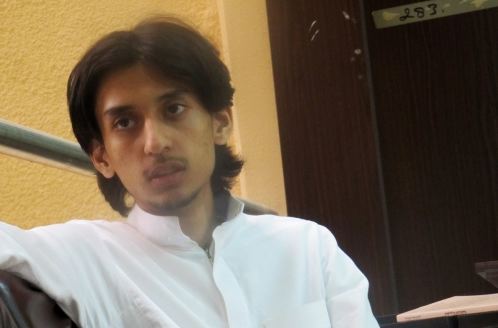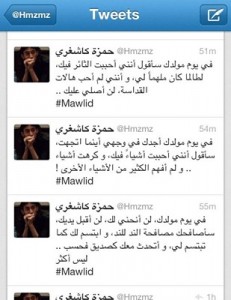Saudi Writer Could Face Death Penalty for “Blasphemous” Tweets
by Eoin Koepfinger / February 24, 2012 / No comments
On February 12, Malaysian authorities deported 23 year-old writer and blogger Hamza Kashgari back to his homeland of Saudi Arabia where he faces trial for apostasy, which carries a possible death sentence. The charges stem from a series of controversial tweets Kashgari posted to Twitter that reference the Prophet Muhammad. This year the Muslim holiday of Mawlid, which commemorates the Prophet Muhammad’s birthday, fell on February 4. On this day Kashgari posted a series of tweets reflecting on his relationship with the religious figure:
[slideshow thumbs=on exclude=23717,23675]
Read Hamza Kashgari’s text to Muhammad, the original context of the tweets.
The tweets ignited outrage that resulted in thousands of Twitter replies, Facebook groups calling for his punishment, and Youtube videos revealing Kashgari’s home address. The outburst escalated to top Saudi clerics, who called for Kashgari’s arrest and trial in a Sharia court.
In response, Kashgari deleted the offending tweets and issued a public apology. He later deleted his entire Twitter account and fled to Malaysia on February 7 in hopes of reaching New Zealand to seek political asylum.
But on Februarly 9, Malaysian police detained Kashgari at Kuala Lumpur International Airport. Despite international outcry, they returned him to Saudi Arabia four days later. Malaysian police indicated that they had acted on an Interpol red notice from Saudi Arabia, a claim denied by both Interpol and Malaysian Minister of Home Affairs Hishammuddin Hussein. Hussein nevertheless justified the detention, adding that Malaysia is not a “safe transit” for fugitives and does not “champion rights for the sake of rights.”
Kashgari’s lawyer, Fadiah Nadwa Fikri, and Lawyers for Liberty allege that Malaysia violated international law by deporting Kashgari. They also allege that Kashgari is being targeted as a pro-democracy activist who has been under surveillance by Saudi intelligence for his support of the Syrian uprising and the wider Arab Spring movement.
While various human rights organizationshave rallied for Kashgari’s immediate release, Saudi Arabia’s highest religious figure, Grand Mufti Abdul Aziz Bin Abdullah Al Shaikh, recently rejected calls to try the defendant in a non-religious court. “All matters related to justice should be reviewed by Sharia courts as God the Almighty said in the Holy Quran. The justice system in Saudi Arabia is fair,” said Al Shaikh.
In an exclusive interview with The Daily Beast before his detainment, Kashgari stated “I view my actions as part of a process toward freedom. I was demanding my right to practice the most basic human rights—freedom of expression and thought—so nothing was done in vain. I believe I’m just a scapegoat for a larger conflict. There are a lot of people like me in Saudi Arabia who are fighting for their rights.”
Some of Hamza’s writings on poverty, religion, and human rights can be found here.
Read an interview with Christopher Wilcke of Human Rights Watch on the implications of the case in the context of the Saudi legal system.






